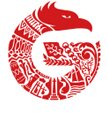The Day Surabaya Sky Was Red
Late October 1945, some 6,000 British troops of the 49th Brigade of the 23rd Indian Division under Brigadier General Mallaby, entered Surabaya with orders to organize the recovery of Allied POW, and disarm the surrendering Japanese troops. However, the British also sought to establish complete control of Surabaya, but had underestimated the extent of Indonesian resistance and the numbers they faced. They found themselves up against a force of 20,000 troops of the newly-formed and Japanese trained People’s Security Army (Tentara Keamanan Rakyat), and over 100,000 irregular fighters, all dedicated to the cause of Indonesian independence.Fierce fighting broke out on 28 October, and soon the Indonesians had surrounded the British command posts scattered throughout the city. A truce was reached on 30 October, but as evacuations to the harbor area was arranged, in the excitement and confusion, more fighting erupted during which Brigadier General Mallaby was killed. The British then decided to take Surabaya by force, and secretly landed 24,000 troops of the battle-hardened 5th Division from Malaysia, with Sherman medium tanks, backed by naval and air support.

Surabaya was mercilessly bombarded from sea and air.
On 9 November, the British gave the Indonesians an ultimatum, ordering their leaders to surrender, and all resistant to give up their weapons. When they refused, Surabaya was mercilessly bombarded on 10 November, heralding a battle that was to last three weeks, at the end of which 200,000 of the town’s population had fled, mainly the elderly, women and children. Over 30,000 Indonesians were killed (most were civilians) and 2,000 British soldiers lost their lives. Lieut-Col. A.J.F. Doulton said in this book “The Fighting Cock”: “the Indonesian people i Surabaya did not care about the victims. If one fell, another one came forward. Bren firing continued to arrive in greater numbers, pushing on and on …”.
The London Times reported on November 13-14, 1945: “The resistance of the Indonesian people in Surabaya became violent”. On Sunday night the Indonesian women came out their homes, saving the dead bodies of the male fighters. The British troops described the battle as ‘hell’ after counting the great number of carriers.
The Battle of Surabaya was the first heaviest single battle after World War II ended of the revolution and became a national symbol of Indonesian resistance. In Indonesia, 10 November is celebrated annually as Heroes Day. During World War II (1941-1945), there was no British general killed in any battle, in a month-long battle in Surabaya, the Brits lost two generals, they were Brigadier General AWS Mallaby, and Mayor General Mansergh.








Comment 1